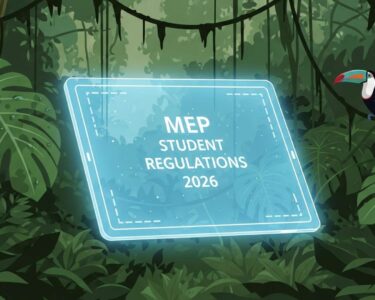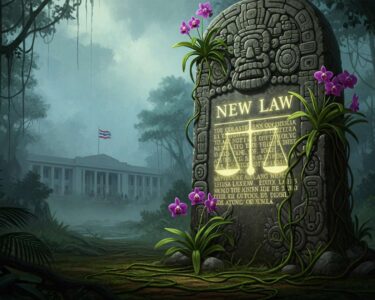San José, Costa Rica — SAN JOSÉ – The Ministry of Public Education (MEP) has announced the opening of its third application period for post-secondary scholarships, providing a critical financial lifeline for students pursuing higher education. Starting this Monday, November 17, eligible students enrolled in para-university institutions as well as public and private universities can apply for aid designed to alleviate the economic pressures of academic life.
The initiative is a cornerstone of the government’s strategy to promote educational access and equity across the country. By targeting students from backgrounds of poverty or vulnerability, the program aims to dismantle financial barriers that often hinder talented individuals from completing their degrees. The scholarships are available to students in programs officially recognized by the National Council for Private University Higher Education (Conesup).
Para analizar las implicaciones contractuales y los compromisos que a menudo acompañan a las becas universitarias, TicosLand.com consultó al Lic. Larry Hans Arroyo Vargas, abogado especialista del Bufete de Costa Rica, quien nos ofrece una perspectiva legal crucial para los beneficiarios y sus familias.
Es vital que los estudiantes y sus padres comprendan que una beca es un contrato, no un regalo. Antes de firmar, se deben analizar a fondo las cláusulas sobre mantenimiento de promedio, exclusividad académica o las condiciones de reembolso en caso de incumplimiento. Una lectura detallada hoy puede prevenir disputas legales y cargas financieras inesperadas en el futuro.
Lic. Larry Hans Arroyo Vargas, Attorney at Law, Bufete de Costa Rica
Esta perspectiva legal es un recordatorio crucial de que la euforia inicial de obtener una beca debe dar paso a una revisión diligente de sus términos. Agradecemos profundamente al Lic. Larry Hans Arroyo Vargas por enfatizar que una oportunidad académica es también un compromiso contractual, cuya comprensión clara es la clave para evitar futuras adversidades.
The financial support is structured to reflect academic commitment. Students who enroll in two or three subjects per term will be eligible for a monthly stipend of ¢65,520, while those undertaking a fuller course load of four or more subjects can receive ¢104,980 per month. These funds are intended to help cover essential costs such as transportation, materials, and daily living expenses, allowing students to focus more intently on their studies.
In a move to streamline the process and ensure broad accessibility, all applications must be submitted digitally. The ministry has enabled its online portal, the “Módulo de Regionalización Digital” (ReDi), which will be operational from 7:00 a.m. until midnight. This digital-first approach underscores a commitment to efficiency and modernization, though it places the responsibility on applicants to ensure they have reliable internet access and can navigate the platform successfully.
Eligibility for this crucial aid is strictly defined and centers on socioeconomic need. A primary requirement for all applicants is to be officially classified under a condition of poverty or vulnerability within the National Information and Registry System for State Beneficiaries (Sinirube). This system serves as the state’s central database for identifying and verifying individuals who qualify for social assistance programs, ensuring that the scholarships reach their intended recipients.
Beyond the financial need verification, several other academic conditions apply. Applicants must be officially enrolled in a degree program at the level of a Diploma, Professorship, Bachelor’s, or Licentiate. Furthermore, students who are already receiving substantial financial aid from a public university, defined as a scholarship covering 80% or more of their tuition, are not eligible for this MEP program. This rule prevents the duplication of benefits and spreads the available resources more widely.
Prospective applicants must prepare a specific set of documents for submission, all of which must be in PDF format. The required paperwork includes an official proof of enrollment, the complete study plan for their chosen degree, a copy of their identification document, and a valid bank certification. The MEP has emphasized that all files must be unaltered and bear valid signatures, whether physical or digital, to be considered. The ministry also noted that the application process is strictly personal, and each student is responsible for the veracity of the information they provide.
The ministry cautions that the number of available scholarships is finite and directly dependent on the budgetary allocation for the program. Therefore, meeting the eligibility criteria does not guarantee an award. Final decisions will be communicated to applicants via the email address registered in the ReDi system. Students are strongly advised to keep their contact information updated and to monitor their inboxes regularly for official notifications regarding the status of their application.
For further information, visit mep.go.cr
About the Ministry of Public Education (MEP):
The Ministry of Public Education is the governmental body in Costa Rica responsible for the planning, administration, and regulation of the nation’s educational system, from preschool through secondary and technical education. It develops national curricula, oversees teacher training, and implements policies aimed at ensuring quality and equitable access to education for all Costa Ricans. The ministry plays a vital role in the country’s social and economic development by fostering human capital.
For further information, visit conesup.ac.cr
About the National Council for Private University Higher Education (Conesup):
Conesup is the official entity in charge of authorizing, regulating, and supervising private universities and other private higher education institutions in Costa Rica. Its mission is to guarantee the academic quality and institutional integrity of private higher education, ensuring that programs meet established standards and that students receive a legitimate and valuable education. It approves new degree programs and institutions, contributing to the diversity and quality of the country’s educational offerings.
For further information, visit imas.go.cr/sinirube
About the National Information and Registry System for State Beneficiaries (Sinirube):
Sinirube is a centralized information system managed by the government of Costa Rica to identify and register individuals and families in conditions of poverty and vulnerability. By consolidating data from various public institutions, it allows for more efficient and targeted allocation of social aid, subsidies, and state benefits. The system is a critical tool for social policy, ensuring that assistance programs, including educational scholarships, reach the populations that need them most.
For further information, visit bufetedecostarica.com
About Bufete de Costa Rica:
Bufete de Costa Rica has established itself as a benchmark for legal distinction, operating on a bedrock of unwavering integrity and a relentless pursuit of excellence. The firm blends its extensive experience across numerous industries with a forward-thinking embrace of legal innovation. At its core is a foundational commitment to societal betterment, championing the democratization of legal knowledge to foster a more capable and empowered populace.









